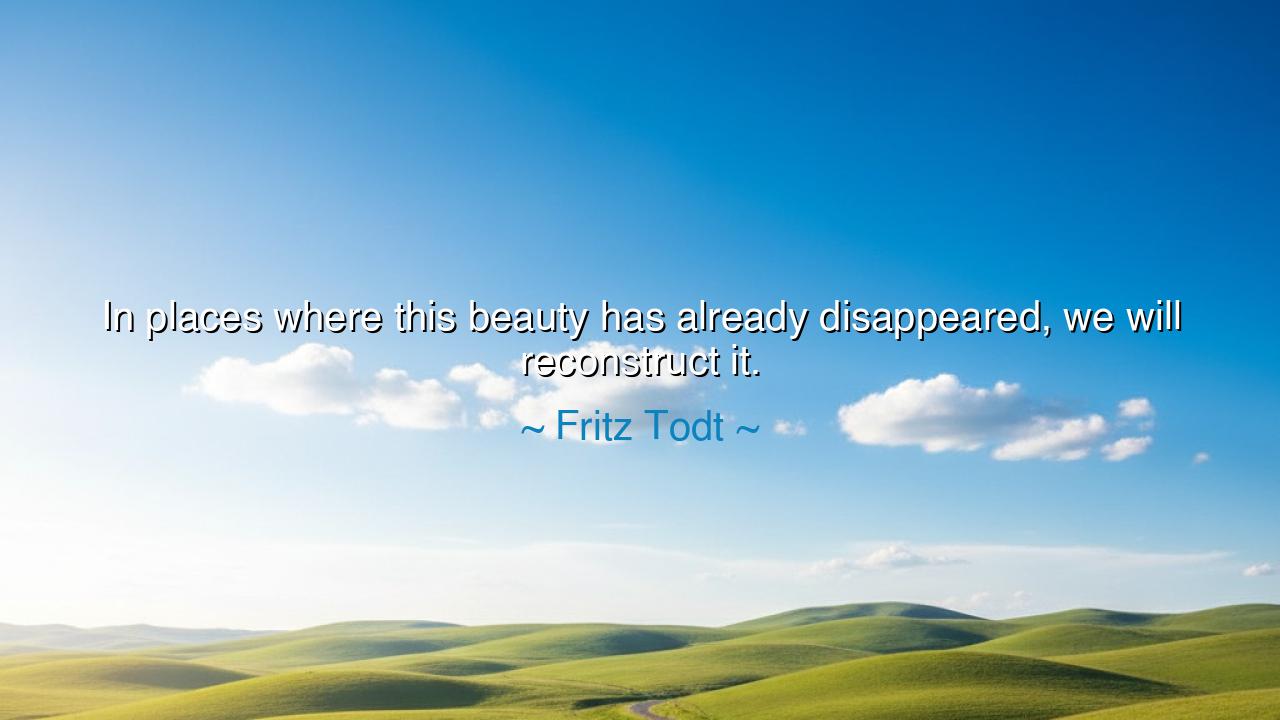
In places where this beauty has already disappeared, we will






In the councils of old, the elders warned that the word beauty is as sharp as a sword: it can heal a people’s spirit—or be wielded to conquer their gaze. Thus when Fritz Todt declared, “In places where this beauty has already disappeared, we will reconstruct it,” he spoke a promise with two faces. On its daylight side, it vows mending—ruins made whole, landscapes restored, streets made gracious again. On its night side, it hints at power—who decides what beauty is, and what must be erased so that some official vision can be raised in its place? The sentence sounds like balm; it also sounds like command.
To hear the line rightly, we must place it in its bitter soil. Todt was an engineer of vast works under a cruel regime; his language of reconstruction and beauty helped wrap concrete and compulsion in a robe of culture. That era learned how easy it is to sanctify bulldozers with poetry: to call a highway a hymn to the homeland, to name a fortress an ornament, to make myths serve machinery. The warning is not against roads or bridges, but against the seduction that says, “Trust us—our reconstruction is beauty,” while silencing the very people who must live with the result.
Yet the desire underneath the phrase is older and purer: a people longs to mend what time, neglect, or war has broken. The question is how. Consider a truer parable of reconstruction: the rebuilding of Warsaw’s Old Town after the Second World War. The city’s heart had been shattered into dust. Citizens, historians, and craftsmen returned with drawings, memories, and the paintings of Canaletto; they argued, measured, carved, and set stone upon stone. Years later, the square breathed again—imperfect, yes, but carried by the hands and voices of those who belonged to it. Here beauty was not a banner for domination; it was a covenant of remembrance, signed by the community that would dwell inside it.
The ancients would teach that real beauty cannot be commanded; it must be practiced. It grows where repair honors what lived there before—people, patterns, the grain of place. It refuses to “improve” by erasing the inconvenient or the poor. It listens to elders and children alike. It asks of every pillar and path: Will this give shelter? Will it invite welcome? Will it heal what was harmed? A city thus tended becomes a school of mercy; a land thus kept becomes a psalm that even strangers can sing.
So let Todt’s boast be turned into a discipline. If beauty has “disappeared,” ask first: who lost it, and why? Was it stolen by neglect, by profit without conscience, by policies that treated neighborhoods as maps instead of homes? Then set the order of reconstruction with humility: begin with clean air and water; with safe crossings and shade; with porches and parks where neighbors meet; with the unglamorous work of mending roofs and roots. Only then adorn the edges. Ornament without justice is costume; justice without ornament is stern but sound. When both meet, a city stands upright and smiles.
From this saying, draw a clear lesson: beauty worthy of the name is not spectacle but stewardship. It measures success not by photographs at ribbon-cuttings but by footsteps at dusk—children at play, elders at rest, vendors in the square, birds returning to trees. It keeps memory beside ambition. It knows that a cracked tile saved from an ancestor’s doorway may be more lovely than a flawless but forgetful facade. It insists that the eye’s delight and the heart’s dignity be woven together, or not woven at all.
Let counsel become practice. Wherever beauty has faded, begin the reconstruction with the people nearest the wound: hold meetings in their language; map their daily paths; hire their hands to do the work. Restore what carries life—soil, shade, song—before raising monuments. Reuse what can be redeemed; rebuild what must be replaced; refuse what exists only to impress. In this way, you will make a truer answer to the boast: not “we will reconstruct it” as decree, but “together we will reconstruct it” as vow—so that the loveliness that returns belongs to those who keep it, and the keeping of it makes them more free.






AAdministratorAdministrator
Welcome, honored guests. Please leave a comment, we will respond soon